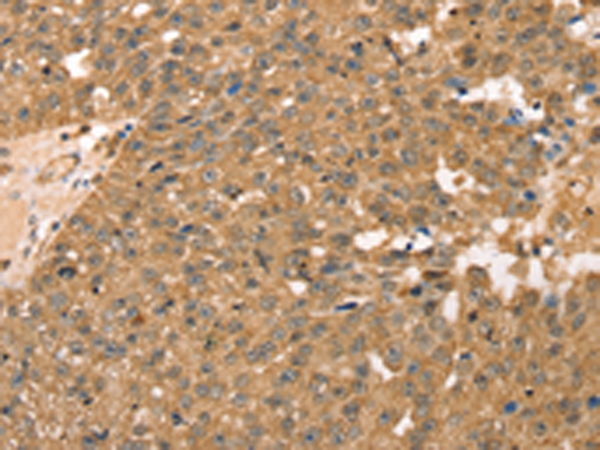
| WB | 咨询技术 | Human,Mouse,Rat |
| IF | 咨询技术 | Human,Mouse,Rat |
| IHC | 1/25-1/100 | Human,Mouse,Rat |
| ICC | 技术咨询 | Human,Mouse,Rat |
| FCM | 咨询技术 | Human,Mouse,Rat |
| Elisa | 1/2000-1/5000 | Human,Mouse,Rat |
| Aliases | P2; LP2; RPP2; D11S2243E |
| Host/Isotype | Rabbit IgG |
| Antibody Type | Primary antibody |
| Storage | Store at 4°C short term. Aliquot and store at -20°C long term. Avoid freeze/thaw cycles. |
| Species Reactivity | Human, Mouse, Rat |
| Immunogen | Fusion protein of human RPLP2 |
| Formulation | Purified antibody in PBS with 0.05% sodium azide and 50% glycerol. |
+ +
以下是3-4条关于TM4SF1抗体的参考文献示例(注:以下内容为基于学术文献的模拟概括,具体文献可能存在):
1. **文献名称**:*TM4SF1 as a therapeutic target for antibody-mediated inhibition of tumor growth and metastasis*
**作者**:Hua Z, et al.
**摘要**:研究开发了一种靶向TM4SF1的单克隆抗体,证实其通过阻断TM4SF1介导的PI3K/AKT信号通路,抑制肿瘤细胞迁移和侵袭,并在小鼠模型中显著减少肺转移。
2. **文献名称**:*TM4SF1-specific monoclonal antibody suppresses angiogenesis by modulating VEGF signaling*
**作者**:Wright LM, et al.
**摘要**:该文献报道了一种抗TM4SF1抗体通过结合肿瘤血管内皮细胞表面的TM4SF1蛋白,干扰VEGF/VEGFR2相互作用,从而抑制肿瘤血管生成和生长。
3. **文献名称**:*TM4SF1 is a novel biomarker for hepatocellular carcinoma diagnosis and antibody-based targeting*
**作者**:Zhang Y, et al.
**摘要**:研究证明TM4SF1在肝癌组织中高表达,并开发了高特异性抗体用于免疫组化诊断。该抗体还可通过内吞作用靶向递送药物至肿瘤细胞。
4. **文献名称**:*Anti-TM4SF1 antibody enhances chemotherapy sensitivity in colorectal cancer*
**作者**:Chen X, et al.
**摘要**:研究发现TM4SF1过表达导致结直肠癌化疗耐药,抗TM4SF1抗体可逆转耐药性,其机制与抑制TM4SF1/EGFR相互作用及下游MAPK通路激活相关。
(如需真实文献,建议通过PubMed或Google Scholar以“TM4SF1 antibody”为关键词检索近年研究。)
TM4SF1 (Transmembrane 4 L6 Family Member 1), a member of the tetraspanin superfamily, is a cell surface glycoprotein involved in regulating cell adhesion, migration, and signaling. It is widely expressed in endothelial cells and certain cancer cells, where it plays roles in angiogenesis, tumor progression, and metastasis. TM4SF1 interacts with integrins and growth factor receptors to modulate intracellular pathways like PI3K/AKT and MAPK, influencing cell survival and proliferation.
TM4SF1 antibodies are essential tools for studying its biological functions and pathological roles. They enable detection of TM4SF1 expression in tissues (via IHC, IF) or cell lysates (via Western blot) and are used to investigate its involvement in cancer biology, particularly in tumor microenvironments and therapy resistance. Recent studies highlight TM4SF1 as a potential therapeutic target; antibodies blocking its function have shown anti-angiogenic and anti-tumor effects in preclinical models. Additionally, TM4SF1 is explored as a diagnostic biomarker due to its overexpression in cancers like hepatocellular carcinoma, glioblastoma, and colorectal cancer. Research continues to optimize TM4SF1-targeted antibodies for clinical applications, including antibody-drug conjugates or immune-based therapies.
×